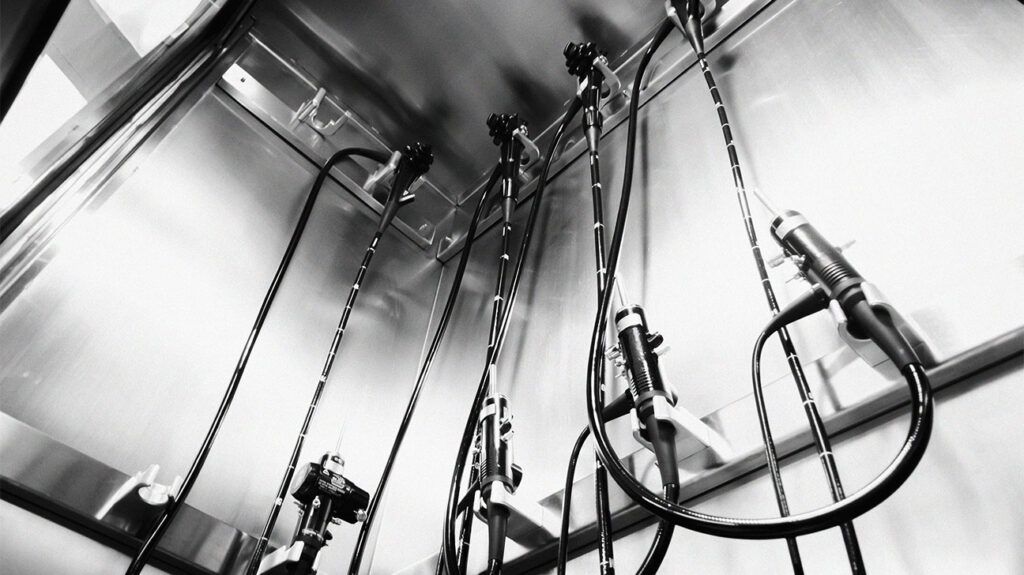A colonoscopy is a telescopic and visual examination of the colon and rectum. It helps doctors detect abnormalities in the bowel, including signs of colorectal cancer, polyps, unexplained diarrhea, and bleeding.
During the examination, a doctor inserts a colonoscope — a small, flexible tube with an attached camera — through the rectum and into the colon. The doctor may also take a tissue sample (biopsy) or remove abnormal tissue during the procedure.
In this article, we describe what individuals can expect during and after a colonoscopy and how they can prepare for this procedure.

A colonoscopy is the
- bleeding from the rectum
- chronic constipation
- chronic diarrhea
- abdominal pain
Cancer screening
A colonoscopy is also the
A colonoscopy can detect early stage colorectal cancer before symptoms develop. Early detection can improve treatment outcomes.
A doctor may recommend a colonoscopy for those who:
- have a first-degree relative with a history of colon polyps or colon cancer
- are at higher risk due to their personal medical history
- are ages 45 or older, even if no other risk factors are present
At what age do people have a colonoscopy?
People of any age can have a colonoscopy, especially if their personal or family history increases their risk of colorectal cancer.
People at average risk should start regular screening at the
Cleansing the bowel
- Dietary changes: The day before the procedure, some dietary changes may be necessary, such as partaking in a liquid-only diet the day prior to a procedure, as well as the day of.
- Clear liquids only: The doctor may ask the person to drink only water, broth, and tea and coffee without milk the day before the procedure.
- Laxatives: It is usually necessary to take laxatives the day before the procedure, either in pill or liquid form. Sometimes, a person may also need to take them on the morning of the colonoscopy.
- Enemas: Some people may need to use an enema kit the night before or on the morning of the procedure.
- Showering or bathing: It is a good idea to shower or bathe before the examination.
People taking any medications or supplements should discuss these with their doctor. The doctor may ask them to stop taking certain medications temporarily or to adjust the dose.
It is especially important to make the doctor aware of medications that:
- thin the blood (such as aspirin or warfarin)
- are for diabetes, hypertension (high blood pressure), or heart problems
- contain iron
A colonoscopy usually takes around 30 minutes. However, people should allocate 2 to 3 hours to the procedure to allow for preparation and recovery time.
During the procedure, the individual will usually wear a hospital gown and lie on their side on an examination table. The doctor will insert the colonoscope into the rectum.
The doctor may use air or carbon dioxide to inflate the colon to facilitate a better view. When this occurs, or when the doctor moves the colonoscope, the person may feel stomach discomfort or an urge to pass stool. These effects are normal.
Is it painful?
A colonoscopy is not typically painful because people generally have the procedure under sedation, which makes them very sleepy and relaxed. Due to the side effects of sedation, a person should not drive themselves home, as they would not be alert enough to drive safely.
After the procedure, people may experience mild discomfort for up to 24 hours. They may develop mild stomach cramping, gas pains, and bloating. In addition to mild discomfort, bleeding may occur if the doctor takes a biopsy or removes abnormal tissue.
Once the doctor has completed the examination, the individual will stay in a special recovery room until the sedative wears off. It is important to take the rest of the day off following the procedure. It is unsafe to drive or work after a colonoscopy, so the person will need to arrange for someone to take them home from the hospital.
A doctor or nurse will advise on how soon a person can eat and drink after the procedure, as well as how quickly they can return to their normal routine.
Some minor discomfort — such as gas, bloating, or mild cramping — is normal after a colonoscopy. Small amounts of blood in the first bowel movement following the procedure are also normal. However, it is important to consult a doctor if the bleeding continues or the stool contains large amounts of blood or blood clots.
If a doctor finds areas of abnormal tissue, such as polyps or other growths, during the exam, they will typically remove them and send them to a laboratory to determine whether they are cancerous or benign (noncancerous).
Polyps are typically benign growths on the inner wall of the colon or rectum.
If the doctor removes polyps or other abnormal tissue, they may recommend regular repeat colonoscopies. How frequently these should occur depends on the size and number of the polyps, as well as other risk factors.
Colonoscopies
Sedation also carries risks, including:
- a decrease in breathing rate
- changes in heart rate
- nausea and vomiting
The cost of a colonoscopy can vary greatly, but it is typically several thousand dollars. It may cost more if the doctor needs to remove an area of abnormal tissue. Other factors influencing the cost include the amount that the doctor charges for the procedure and the type of facility where it occurs.
Medical insurance may cover all or part of the cost of the procedure. Individuals should contact their insurer to find out more.
Medicare, for example, covers colonoscopies once every 2 years for those at high risk of colorectal cancer. It also covers the procedure once every 10 years for those who are not at high risk.
Medicare may charge an additional fee if a doctor removes abnormal tissue during the procedure.
A colonoscopy is a common, important, and relatively safe screening examination to investigate gastrointestinal issues and check for signs of colorectal cancer. Individuals at higher risk of colorectal cancer and older adults may need regular colonoscopies to monitor their bowel health.
The procedure is not typically painful, although it may cause mild discomfort for a day or so afterward. Those who have queries about colonoscopy procedures should contact their doctor for more information.


